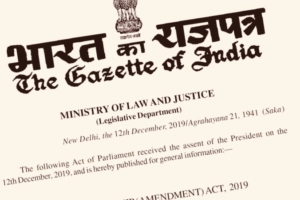By Oona Singh
Indian Parliament passed the Citizenship Amendment Act 2019 (CAA) in December of 2019. Very quickly the act was subject to public criticism, concern, and uproar. The issues around the act are related to concerns surrounding its unconstitutional nature. The act outlines new provisions for citizenship. The pathways to citizenship provided by the act are for illegal immigrants in India – under the conditions that those of Hindu, Sikh, Buddhist, Jain, Parsi and Christian faiths are fleeing religious persecution from the countries of Afghanistan, Bangladesh and Pakistan.
India’s largest religious minority is Muslim. CAA through its very noticeable exclusion of Muslims, only further exacerbated a growing rift between the Muslim population and its Bharatiya Janata Party (BJP) party. The BJP itself was formed from Hindu nationalist agenda. Corrosive to the lifeblood of the nation, CAA is remarkably discriminatory and divisive. The widening chasm between populations within the public mean existing divides are only further exacerbated. Moreover, the act itself seems highly arbitrary and provides no compelling reasons for what it delineates.
Sadly, exclusionary practices on the subcontinent are not novel – beginning with the permit system at the time of Partition. It is evident that these practices are incredibly worrying. If India has any hopes of maintaining its constitutional ambitions of liberty, justice, equality, fraternity and secularism, CAA 2019 should be condemned. The divisive nature of partisan politics is especially evident in the case of CAA 2019. The reconstruction of fact and historical narrative or the practice of narrativizing reality is something the BJP has become adept at.
In Indian jurisprudence, equality has been conceptualised as antithetical to arbitrariness.
The failure of the Centre to provide grounds for the exclusion of Muslims, and other countries is cause for concern on the grounds of arbitrariness. Why have the Statements of Objects and Reasons excluded mention of refugees that are fleeing non-religious persecution? Or its other neighbouring countries or countries whose people it has historically provided refuge to? The statement of objects and purposes would mean that it is highly unequal on these grounds. The statement of objects and purposes does not delineate why, other neighbours have been left out and the three countries protected are Pakistan, Afghanistan, and Bangladesh. Furthermore, there has been no sound argument provided by the Centre as to why Muslims have been left out.
The Indian nation has been home to many refugees since its inception, of which there are those that flee on the basis of non-religious reasons. Thus, these requirements for eligibility for only religious persecutions is highly arbitrary. Analysis of the act – can reveal illuminating perspectives pointing to the fact that the act itself really isn’t constitutional. For instance, Article 14, the inalienable right to equality has become a large point of contention with the act. Article 14 dictates this right is afforded to all on Indian territory, population citizen or not. On this ground the act is a denial of a fundamental right, thus discriminatory and a violation of a constitutional right. Furthermore, the Indian jurisprudence has revealed while reasonable classification is fine within the Constitution, class legislation is not. CAA violates this.
Ultimately, it would seem that CAA 2019 is the latest in a string of actions by the BJP which polarises and divides its nation. It is a worrying precedent to be setting in a country which historically and ideally proposes ideals of secularism and equality – CAA 2019 is discriminatory and arbitrary. It is also a threat to the very principles the largest democracy in the world is premised on.
*I would like to acknowledge that given the brevity of this piece perhaps the nuance of this historically entrenched issue cannot be explored*
A little about Oona:
Oona is a graduate from the University of St Andrews, she did a joint degree in International Relations and Social Anthropology.

